- Home
- McBain, Ed
Killer's Payoff Page 2
Killer's Payoff Read online
Page 2
He seemed to be a decent, upright, honest citizen.
And yet he was interested in the apparent gangland murder of a known blackmailer.
And Bert Kling wondered why.
2.
THERE HAD BEEN A TIME when Detective Steve Carella had considered Danny Gimp just another stool pigeon. He had considered him a good stoolie, true, and a valuable stoolie—but nonetheless a pigeon, a somewhat-pariah who roamed the nether world between criminal and law-enforcement officer. There had been a time when, had Danny Gimp dared to call Carella “Steve,” the detective would have taken offense.
All that had been before December.
In December, Steve Carella had managed to get himself shot. He would never forgive himself for having been shot that day in December. In fact, he would always refer to December twenty-second as the day of his idiocy, and he would allow that idiotic day to live in his memory as a reminder never to rush in where angels feared. He truthfully had come very close to joining the band of angels on those few days before Christmas. Somehow, miraculously, he’d managed to survive.
And it was then that he had learned Danny Gimp was waiting downstairs to see him.
Steve Carella had been a very surprised cop. Danny Gimp entered the hospital room. He’d been wearing his good suit, and a clean shirt, and he’d carried a box of candy under his arm, and he’d embarrassedly handed Carella the gift and then mumbled, “I’m…I’m glad you made it, Steve.” They had talked until the nurse had said it was time for Danny to go. Carella had taken his hand in a firm clasp, and it was then that Danny had ceased being just another stool pigeon and become a human being.
On the morning of June twenty-eighth, after a call from Carella, Danny limped into the squadroom of the 87th Precinct. The bulls on the squad had recently wrapped up the murder of a girl who’d worked in a liquor store, and now they were up to their ears in another homicide, and this one seemed to require the special talents of Danny Gimp. The men of the 87th would not be called for testimony in the trial of Marna Phelps until August—but this was June, and there was work to be done, and you didn’t sit around on your ass waiting for trials if you wanted to earn your salary. If you wanted to earn your salary, you got up from behind your desk the moment you saw Danny standing at the slatted rail divider. You went to him with your hand extended, and you greeted him the way few policemen greet stool pigeons. But Danny Gimp was not a stool pigeon to you. Danny Gimp was a human being.
“Hello, Steve,” Danny said. “Hot enough for you?”
“Not too bad,” Carella said. “You’re looking good. How’ve you been?”
“Fine, fine,” Danny said. “The rain slaughtered my leg, but you know how that is. I’m glad it cleared up.”
Danny Gimp had had polio as a child. The disease had not truly crippled him, although it had left him with the limp that would provide his lifelong nickname. Carella knew that old wounds ached when it rained. He had old wounds to prove it. It came as no surprise that Danny’s leg had bothered him during the past week of rain. It would have come as a surprise to Carella to learn that Danny harbored no ill feeling toward his leg or the disease that had caused his limp. It would have come as a greater surprise to learn that Danny Gimp lighted a candle in church each week for a man named Jonas Salk.
The men walked into the squadroom. At a near-by desk, Cotton Hawes looked up from his typing. Bert Kling, closer to the grilled windows that fronted on Grover Park, was busy talking on the telephone. Carella sat, and Danny sat opposite him.
“So what can I sell you?” Danny asked, smiling.
“Sy Kramer,” Carella said.
“Yeah,” Danny answered, nodding.
“Anything?”
“A crumb,” Danny said. “Blackmail, extortion, the works. Living high on the hog for the past nine months or so. He musta latched onto something good.”
“Any idea what it was?”
“Nope. Want me to go on the earie?”
“I think so. What about this killing the other night?”
“Lots of scuttlebutt on it, Steve. A thing like that, you figure right away the racket boys. Not so, from what I can pick up.”
“No, huh?’
“If it was, it’s being kept mighty cool. This is old hat, anyway, this torpedo crap. Who hires guns nowadays? And if you do, you don’t do it up dramatic, you dig me, Steve? This crap went out with movies about bootleg whisky. If you need somebody out of the way, you get him out of the way—but you don’t come screaming around corners in black limousines with machine guns blazing. Once in a while you get something with flair. The rest of the time it’s a quiet plop, not a noisy bang. You dig?”
“I dig,” Carella said.
“And if this was a gang thing, I’d’ve heard about it. There ain’t much I don’t hear. If this was a gang thing, there’d be some jerk havin’ a beer and spillin’ over at the mouth. I figure it different.”
“How do you figure it?”
“One of Kramer’s suckers got tired of havin’ Kramer on his back. He got himself a car and a gun, and he went on a shooting party. Good-by, Sy, say hello to the man with the horns and the pitchfork.”
“Whoever did the shooting was pretty good, Danny. Only one shot was fired, and it took away half of Kramer’s face. That doesn’t sound like an amateur.”
“There’s lotsa amateurs who can shoot good,” Danny said. “It don’t mean a damn thing. Somebody wanted him dead pretty bad, Steve. And from what I can pick up, it ain’t the gangs. Half the racket boys never even hearda Kramer. If you’re workin’ what he was workin’, you do it alone. It’s common arithmetic. If you work it with a partner, you have to split everything but the prison sentence.”
“You’ve got no idea who he was milking?” Carella asked.
“If I knew, I’d have tried to get in on it myself,” Danny said, smiling. “I’ll try to find out. But the secret of extortion is just that: the secret. If too many people know about it, it ain’t a secret any more. And if it ain’t a secret, why should anybody pay off to protect it? I’ll listen around, I’ll go on the earie. But this is a tough thing to find out.”
“What do you know about a man named Mario Torr?”
“Torr, Torr,” Danny said. “Torr. It don’t ring a bell.”
“He took a fall for extortion in 1952,” Carella said. “Got one-to-two on the state, paroled in fifty-three. Had a previous arrest for blackmail. He’s allegedly honestly employed now, but he’s interested in Kramer’s death, claims he was a good friend of Kramer’s. Know him?”
“It still don’t ring,” Danny said. “Maybe he really did go straight, who knows? Listen, miracles can happen, you know.”
“Not often enough,” Carella said. “Have you seen any imported talent around?”
“You’re thinking Kramer was important enough to hire an out-of-town gun? Steve, believe me, this is crazy reasoning.”
“Okay, okay. But is there any imported stuff around?”
“A hood from Boston. They call him Newton, cause that’s where he’s from.”
“A gun?”
“I think he cooled a few, but you can’t prove it by me. He ain’t here for that, though.”
“Why’s he here?”
“They’re tryina set up something between here and Boston. This Newton is just a messenger boy, so the Bigs don’t hafta be seen together. He ain’t the guy who cooled Kramer.”
“Where is this Newton?”
“He’s shacked in a hotel on The Stem, downtown. The Hotel Rockland. His last name’s Hall.” Danny chuckled. “He sounds like a girls’ finishing school, don’t he? Newton Hall.” Danny chuckled again.
“You don’t think he’s worth looking up?” Carella asked.
“A waste of time. Listen, do what you want to do. I don’t run the squad. But you’re wastin’ time. Let me listen a little. I’ll buzz you if I get anything.”
“What do I owe you?” Carella asked, reaching into his pocket.
“Wait’ll I gi
ve you something,” Danny said.
He shook hands and left the precinct. Carella walked over to Hawes’s desk.
“Get your hat, Cotton,” he said. “There’s a bum I want to pick up.”
COTTON HAWES was a recent transfer to the 87th Squad.
He was six feet two inches tall, and he weighed one hundred and ninety pounds bone dry. He had blue eyes and a square jaw with a cleft chin. His hair was red except for a streak over his left temple, where he had once been knifed and where the hair had curiously grown in white after the wound had healed. His straight nose was clean and unbroken, and he had a good mouth with a wide lower lip.
He also had good ears. He had been with the 87th for a very short time, but he had learned during those weeks that Steve Carella was a good man to listen to. When Carella spoke, Hawes listened. He listened to him all the way down to the Hotel Rockland in the police sedan. He listened to Carella when he flashed his tin at the desk clerk and asked for the key to Hall’s room. He stopped listening only when Carella stopped talking, and Carella stopped talking the moment they stepped out of the elevator into the fourth-floor corridor.
There was, perhaps, no need for extreme caution. Unless Hall had been in on the Kramer kill, in which case there was need for extreme caution. In any case, both detectives drew their service revolvers. When they reached the door to Hall’s room, they flanked it, and Carella’s arm was the only portion of his body that presented a target as—standing to one side of the door—he inserted the key and rapidly twisted it. He flung open the door.
Newton Hall was sitting in a chair by the window, reading. He looked up with mild surprise on his face, and then his eyes dropped to the guns both men were carrying, and fear darted into those eyes.
“Police,” Carella said, and the fear vanished as suddenly as it had appeared.
“Jesus,” Hall said, “you scared me for a minute. Come on in. Put away the hardware, will you? Sit down.”
“Get up, Hall,” Carella said.
Hall rose from the chair. Hawes quickly frisked him.
“He’s clean, Steve.”
Both men holstered their guns.
“You got identification, I suppose,” Hall said.
Carella was reaching for his wallet when Hall put out his hand to stop him. “Never mind, never mind,” he said. “I was just asking.”
“When’d you get to town, Hall?” Carella asked.
“Monday night,” Hall said.
“The twenty-fourth?”
“Yeah. Listen, did I do something?”
“You tell us.”
“What is it you want to know?”
“Where were you Wednesday night?” Hawes asked.
“Wednesday night?” Hall asked. “Let me see. Oh yeah, I was with a broad.”
“What was her name?”
“Carmela.”
“Carmela what?”
“Carmela Fresco.”
“Where’d you go?”
“We stayed right here.”
“All night?”
“Yeah.”
“From what time to what time?”
“From about nine o’clock until the next morning. She left after breakfast.”
“What’d you do all that time?” Hawes asked.
Hall grinned. “What do you think we did?”
“I don’t know. You tell us.”
Hall was still grinning. “We played Parchesi,” he said.
“Leave the room at all during that time?”
“Nope. Here all night. I like Parchesi.”
“Do you know a man named Sy Kramer?” Carella asked.
“Oh,” Hall said. “That. I mighta known.”
“Did you know him?”
“No. Never met him. I read about the killing in the newspapers.”
“But you’d never met him?”
“Nope.”
“Ever hear of him before?”
“Nope.”
“Why’d you come here from Boston?”
“A little rest. See some of the shows. You know. Like that.”
“What shows have you seen so far?” Hawes asked.
“None,” Hall admitted. “It’s pretty rough to get tickets, you know? Except for the longhair stuff. Who wants to see the longhair stuff? I like musicals. Songs, girls, that’s for me. Good-time Charlie, that’s me.” He snapped his fingers. “I got a friend who gets ice, you know what that is?”
“What is it?” Hawes asked.
“Free tickets. Not really free. Well, like they’re paid for at box-office prices, but he sells them back a little higher, you know what I mean? The difference between the box-office price and what he gets is called ice. So he gets ice. Only he can’t fix me up yet. Tickets are hard to get nowadays.”
“And that’s why you’re here, right? To see a few shows.”
“Yeah, and to take a rest.”
“But you haven’t seen any shows yet?”
“No.”
“Have you rested?”
“Well, you know…”
“Good-time Charlie, that’s you,” Carella said.
“Sure. Good-time Charlie, that’s me.”
“Where do we get in touch with this Carmela Fresco?”
“Why drag her into this?” Hall said.
“Have you got a better alibi?”
“No, but…She’s just a kid. I know her, and we…”
“How old?” Hawes snapped.
“Nothing like that,” Hall said. “She ain’t underage, don’t worry about that. I wasn’t born yesterday. But she’s a kid. You go around asking questions, you’ll scare the hell out of her. Also, you might ruin a good thing for me.”
“That’s too bad,” Carella said.
“What makes you think I had anything to do with the Kramer kill, anyway?” Hall said.
“Do you know who did?”
“That’s a stupid question.”
“Why?”
“Let’s assume I did know, okay? Let’s assume I know who hired some guys to kill Kramer. To kill him, now. Not to scare him or warn him or anything like that. To kill him. Cool him. Put him away. So these guys mean business, right? These guys ain’t playing around. So do you think I would open my mouth on these guys who mean business, these guys who ain’t playing around, these guys who hired some other guys to kill a guy? To kill him! Oh, you got to be real foolish to open your mouth on these rough fellows, don’t you?”
“Are there some rough fellows in this, Hall?”
“I’ll tell you the truth, I don’t know. That’s the truth. I don’t usually assist bul—detectives, but this time I think you’re barkin’ up the wrong tree. If this was a rackets thing, I woulda heard about it. And I didn’t hear nothin’.”
“There’s another possibility, of course,” Hawes said.
“Yeah, what’s that?”
“You could have killed Kramer.”
“The only thing I killed on Wednesday night was a girl named Carmela Fresco. I send that kid, believe me. I send her! When she leaves me, she’s killed. Dead. Unconscious.” Hall smiled. “I tell you the truth, she kills me, too. It’s a good arrangement.”
“Like Murder, Incorporated,” Carella said.
“Something like that. A mutual stoning society, so to speak. We stone each other. Oh Jesus, does that kid stone me!”
“How do we reach her, Hall?”
“She’s in the book.”
“What’s the number?”
“I told you. She’s in the book.”
“We can’t read,” Hawes said.
“Aw, come on, don’t let me be the bastard, huh?” Hall said. “This way you can tell her you got it from the book. You’ll be tellin’ the truth.”
“We don’t mind lying a little,” Carella said. “What’s her number? We’ll say we got it from the book.”

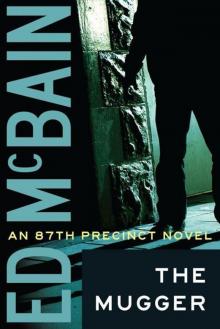 87th Precinct 02 - The Mugger
87th Precinct 02 - The Mugger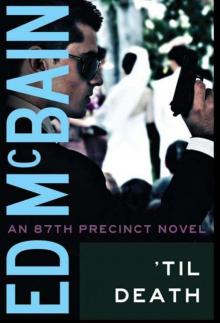 87th Precinct 09 - Til Death
87th Precinct 09 - Til Death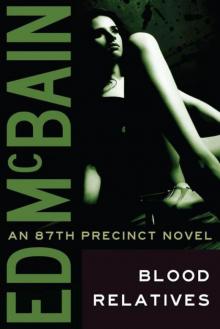 Blood Relatives (87th Precinct)
Blood Relatives (87th Precinct) Killer's Payoff
Killer's Payoff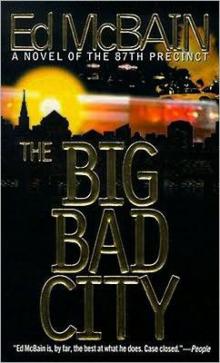 The Big Bad City
The Big Bad City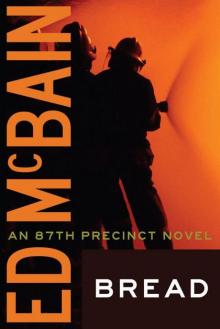 Bread (87th Precinct)
Bread (87th Precinct) Transgressions Vol. 3
Transgressions Vol. 3 Runaway
Runaway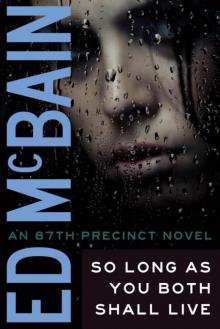 So Long As You Both Shall Live (87th Precinct)
So Long As You Both Shall Live (87th Precinct)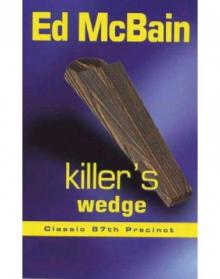 Killer's Wedge
Killer's Wedge